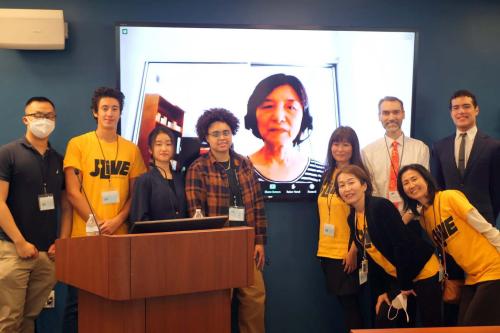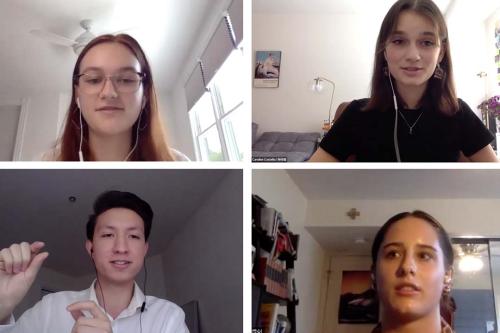2022 East Asian Languages and Literatures Newsletter

Message from the Chair
Department Spotlights
Department Kudos
Alumni Class Notes
Message from the Chair
Greetings to all of our alumni from the George Washington University Department of East Asian Languages and Literatures!
As acting chair of EALL, I want to thank my dear predecessor Shoko Hamano for her years of outstanding service to our faculty and our department. She has made an impact in our department and university, and I hope to do the same.
Through this newsletter, you’ll read about a few of the exciting things happening in the department, including the achievements of our EALL community and news from across Columbian College and the university. There are also some fabulous alumni events on the docket, and I hope you have the opportunity to attend one of them and engage with fellow graduates.
Thank you so much for your support and involvement. Please stay in touch.
Sincerely,
Immanuel Kim
Acting Chair, Department of East Asian Languages & Literatures
Department Spotlights
Keti Vutipawat (student assistant), Matthew Lepis (student assistant), Haruka Satake (MC), Ellis Davis (student volunteer), Prof. Shoko Hamano, Prof. Takae Tsujioka, Prof. Wakana Kikuchi, Prof. Brendan Morley, Prof. Kaori Iwai, and Nicholas De Valpine (MC)
J.LIVE Talk 2022 Delivered as Hybrid Event
On November 13, the Japanese Program hosted the 8th annual J.LIVE Talk (Japanese-Learning Inspired Vision and Engagement), the first-ever hybrid event of its kind. There were 74 applicants from 11 states and the District of Columbia selected for the first round of judging. The entire event can be viewed on YouTube, and the program is available online.
Of the 12 finalists selected through a rigorous first- and second-round selection process, three high school students presented online and nine college finalists presented in person at the Elliott School of International Affairs. In addition, for the first time this year, the high school group category included a video competition with the theme "Our School and the Environment Surrounding It," and viewers voted for the top three schools selected in the preliminary screening.
GW students during a panel at the conference. Clockwise from top left: Annika Houge, Caroline Costello, Alexis Nothelfer and Julian Anderson
GW Leads Innovative Teaching on Chinese Characters
The first international conference on L2 Hanzi Teaching and Learning in the Digital Age was held virtually at GW during summer 2022, as the inaugural event in our “Advancing Chinese Teaching: Innovations, Outcomes, and New Directions” series.
The conference was a great success with 650 registrants from 15 different countries. Experts and professionals in Chinese teaching and research convened during this two-day event to share their common vision and goal to make it more efficient and effective for learners to attain digital literacy in Chinese, facilitated by new technological tools. The EALL Chinese program is a pioneer and leader in such pedagogical innovations in the past decade.
Department Kudos
- Jonathan Chaves’ translations, first published in 1993, of Wu Li, S.J. (1632-1718)'s important twelve-poem cycle, Singing of the Source and Course of Holy Church, is anthologized complete, with scholarly annotations, in Burl Horniachek, ed., To Heaven’s Rim: The Kingdom Poets Book of World Christian Poetry in English Translation, Beginnings to 1800, Eugene Oregon: Wipf & Stock (Cascade Books). This is an anthology of unique importance in linking Wu Li, one of China's greatest painters and a convert to Catholic Christianity, with some of the most important early Church Fathers, and such masters as Dante, Petrarch, François Villon, Michelangelo (a poet as well as painter and sculptor), Tasso, Lope de Vega and Racine, showing how China's major master of classical poetry grounded in Christian theology stands side-by-side with these giants of world literature. When first published by Professor Chaves, Wu Li's work in this area was unknown in the West except to a small circle of specialists. Wipf & Stock is now one of the major publishers of scholarly books with Christian subjects. Additionally, Professor Chaves’ other translations are part of two exhibitions at the Metropolitan Museum of Art, one of Chinese paintings, the other of kimono. The reason for the latter is that a line of Chinese poetry by a Japanese courtier is recorded in the bilingual (Chinese and Japanese) poetry anthology, Wakan rōei shū 和漢朗詠集 of the early 11th century. Professor Chaves co-published the first complete Western-language translation of this classic with J. Thomas Rimer as Japanese and Chinese Poems to Sing in 1997, and it won the Japan-U.S. Friendship Commission Prize for best translation.
- Hongyuan Dong published "Temporal partitions in the grammaticalization of imperfective aspect markers: A formal semantic approach." Language and Linguistics 23.2 (2022): 191-211. Professor Dong was also invited to give two lectures: one titled “Historical origins of aspect markers in Mandarin and Cantonese” at Georgia Institute of Technology on April 15, 2022; the other titled “History of the Chinese writing system” at the Monday Morning Lectures series organized by Friends of the Museums in Singapore on October 10, 2022.
- Shoko Hamano published “Idiophones in Japanese and Korean” in The Handbook of Asian Linguistics, Chris Shei and Saihong Li (eds.). Routledge, 2022: 225-244.
- Immanuel Kim published “A Good Wife is Hard to Find” in The Routledge Companion to Korean Literature. Edited by Heekyoung Cho. New York: Routledge, 2022: 441-452. He was also interviewed by Arirang Radio for the program “North Korea Now.”
- Young-Key Kim-Renaud was quoted by Japan’s Kyodo News Agency in the article “Ukraine woes may cement North Korea’s resolve to hang on nuclear arsenal.”
- Brendan Morley published “Kanbun, Kundoku, and the Language of Literary Sinitic: Terminological Issues in the Study of Sinography in Japan” in Japanese Language and Literature, 56.2 (2022), 329-354.
- Miok Pak published “Allocutive imposters in the form of referent honorification” in the Proceedings of Linguistic Society of America 7(1). 5221; “Restrictions on Indexicals in Directive Clauses,” in Linguistic Inquiry 1-22 (with Paul Portner and Raffaella Zanuttini), and “Dimensions of Honorific meaning in Korean Speech Styles” in Pak, Miok, Portner, Paul & Zanuttini, Raffaella (eds.), Speaker, Addressee, and Social Relation. Glossa: a journal of general linguistics 7(1) with Paul Portner and Raffaella Zanuttini). Professor Pak served as a co-editor of the special collection Speaker, Addressee, and Social Relation. Glossa: a journal of general linguistics. Professor Pak was also invited to give a keynote presentation titled “Future Prospect of Korean education utilizing Educational Gamification” at the 24th International Conference of Korean Language Education Research Institute at Seoul National University, October 29, 2022, and a talk “Theorizing Korean Honorifics and Politeness,” at the lecture series hosted by the department of Korean Language Education, Seoul National University, October 28, 2022, as an invited foreign scholar guest speaker. Professor Pak also received a $19,882 grant from The Korea Foundation for the GW Gamification Textbook Project.
- Hang Zhang published “From individual tones to connected speech” in Frontiers of L2 Chinese Education: A Global Perspective (Routledge, pp. 30-50) and “Acquisition and Pedagogical Issues of the Third Tone” in the journal International Chinese Language Education (Vol. 7-3, pp. 53-61). Professor Zhang was also invited to give lectures and keynote presentations in the U.S. and abroad, including “Phonological Constraints and the L2 Acquisition of Chinese tones” at Columbia University (May 27, 2022), “Re-conceptualizing the Chinese Tones” at the Canadian High-End Forum on International Chinese Language Teaching (Jan.15, 2022) and “Understanding Tones in Various Speech Production Context” as part of the Thematic Roundtable series (virtual) organized by the Australian National University (Nov. 7, 2022).
- Phyllis Zhang published a journal article "Typing to Replace Handwriting: Effectiveness of the Typing-Primary Approach for L2 Chinese Beginners" in Journal of Technology and Chinese Language Teaching, Vol 12-2 (2021), pp. 1-28. She also gave two virtual presentations: 1) a workshop E-Writing training and assessment strategies at 2022 ACTION at the GW/Summer Chinese Institute, George Washington University, July 31, 2022 (330 participants); and a keynote speech titled "Dynamic development of Chinese proficiency: A training-mode framework" at the 2022 Spring Conference (virtual), Chinese Language Teachers Association of California, Mar 5, 2022.
Alumni Class Notes
- Katherine Alesio, BS ’21, is a civil engineering firm doing utility design and still studying Chinese in her free time.
- Anna Day, BA ’22, is studying at the Inter-University Center for Japanese Studies in Yokohama, Japan. She hopes to find IT-related work after graduating.
- Tyler DiMicco, BA ’11, lives in Beijing, China, where he is director of strategic product management and chief of staff to the corporate VP and managing director of Amazon Web Services, Greater China.
- Tianyu Fan, MA ’19, recently published three books of Chinese translations of works on creative writing: (1) 渴望写作 [The Desire to Write by Graeme Harper]. Beijing: Renmin University Press, 2022; (2) 剑桥创意写作导论 [The Cambridge Introduction to Creative Writing by David Morley]. Beijing: Renmin University Press, 2022; (3) 创意写作基础研究 [Key Issues in Creative Writing by Dianne Donnelly and Graeme Harper]. Shanghai: Shanghai University Press, 2022.
- Elizabeth Heller, BA ’10, worked with an education nonprofit in Beijing, China, for three years after graduating from GW and is now with an international development consulting firm in D.C.
- Todd Platek, Esq., BA ’74, published his first novel, G88, which can be found via his website.
- Alice Rees, BA ’21, is a coordinator for international relations in the prefectural government section Toyama Prefecture, Japan. This year, she served as a translator and interpreter for sister state exchanges between Toyama and Oregon.




